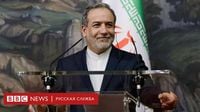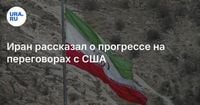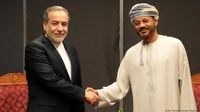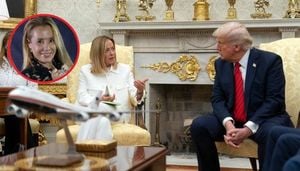Negotiations between Iran and the United States have resumed, this time in Rome, amid a backdrop of cautious optimism but without any significant breakthroughs. The second round of talks, which took place on April 18, 2025, was characterized by Iranian officials as occurring in a "constructive atmosphere," although no concrete agreements were reported. This meeting followed the first round held a week prior, which also involved Omani mediation. Unlike the previous discussions in Muscat, the latest negotiations occurred at the residence of the Omani ambassador in Italy.
The Iranian delegation was led by Foreign Minister Abbas Aragchi, while the U.S. side was represented by presidential envoy Steve Uikoff, known for his involvement in complex diplomatic negotiations during the Trump administration. According to Iranian state media, the discussions lasted approximately four hours. Following this round of negotiations, both parties agreed to reconvene at a technical level in the coming days, with a further meeting planned for senior negotiators on April 26, 2025.
The talks primarily focus on Iran's nuclear program, which Tehran insists is intended solely for peaceful purposes. However, the International Atomic Energy Agency (IAEA) has expressed concerns, noting that Iran possesses a significant stockpile of highly enriched uranium, potentially enabling it to develop nuclear weapons swiftly. Since the U.S. withdrew from the multilateral nuclear agreement in 2018, Iran's nuclear advancements have accelerated, raising alarms about the possibility of military conflict if diplomatic solutions are not reached.
In a statement to Iranian television, Aragchi remarked, "This time we were able to achieve a better understanding on a whole range of principles and goals." Meanwhile, the Omani Foreign Ministry expressed optimism, stating that the negotiations are "gaining momentum and are now even more likely to succeed." The goal, as articulated by Omani officials, is to establish a fair, long-term, and binding agreement that guarantees Iran's freedom from nuclear weapons and sanctions while allowing it to develop peaceful nuclear energy.
However, the two sides seem to have differing interpretations of the negotiation format. Tehran describes the discussions as informal, indicating that the Iranian and U.S. delegations were kept in separate rooms, with Omani Foreign Minister Badr al-Busaidi relaying messages between them. In contrast, Washington is pushing for a more transparent and direct dialogue. During the previous meeting in Muscat, Uikoff and Aragchi managed to converse face-to-face for about 45 minutes, a sign of potential thawing relations.
As the negotiations unfold, Iran has made it clear that it seeks assurances that any future nuclear deal with the U.S. will not be unilaterally terminated, recalling the previous agreement that was abandoned in 2018. A senior Iranian official emphasized that Tehran is unwilling to cross the "red lines" set by Supreme Leader Ayatollah Ali Khamenei, including a complete abandonment of nuclear technologies and a reduction of enriched uranium levels to those outlined in the 2015 agreement.
While Iran is open to some concessions, the specifics remain undisclosed. In exchange for these concessions, Iran is demanding the lifting of sanctions that have crippled its economy. On the U.S. side, Uikoff has reiterated that a deal is contingent upon Iran ceasing its uranium enrichment program altogether. This stance marks a significant hardening of Washington's position, as Uikoff had previously suggested that Iran could continue enriching uranium for civilian purposes under strict international oversight.
The next round of negotiations is set to occur in Rome, with both parties hopeful for progress. The Iranian delegation, once again led by Aragchi, will meet with Uikoff, with Omani Foreign Minister al-Busaidi serving as a mediator. The first round of talks, held in Muscat, lasted about two hours and was described by the White House as a "great step forward". Officials characterized the discussions as positive and constructive, with al-Busaidi noting a "friendly atmosphere" that fostered dialogue.
However, the stakes are high. President Trump has reportedly given Tehran a 60-day deadline to achieve a successful outcome in the negotiations, warning that failure to do so could result in military action. Just weeks ago, he threatened Iran with bombings and secondary sanctions if it did not demonstrate a willingness to negotiate.
In the lead-up to these negotiations, Aragchi met with Russian Foreign Minister Sergei Lavrov in Moscow, where Lavrov indicated that Russia is willing to facilitate any potential agreements between Washington and Tehran, provided they are mutually acceptable and respect Iran's legitimate interests.
Reports indicate that during the discussions in Oman, Uikoff proposed that Iran transfer its enriched uranium reserves to a third country, such as Russia. However, Tehran is expected to resist this suggestion, asserting its right to maintain its nuclear program.
While the Iranian government denies any intentions of developing nuclear weapons, it continues to restrict access for international experts to its nuclear facilities, citing the need for sanctions relief. The head of the IAEA, Rafael Grossi, has warned that Iran is close to acquiring enough enriched uranium to create an atomic bomb, stating that the country is "sooner in weeks than in months" from achieving this capability.
The backdrop of these negotiations is the 2015 Joint Comprehensive Plan of Action (JCPOA), which aimed to limit Iran's nuclear program in exchange for sanctions relief. Following the U.S. withdrawal from the agreement in 2018, Iran began to roll back its commitments, leading to increased tensions and uncertainty regarding its nuclear ambitions.
As the talks continue, both sides remain entrenched in their positions, with the world watching closely to see if a breakthrough can be achieved that will avert a potential crisis and lead to a more stable nuclear framework in the region.






